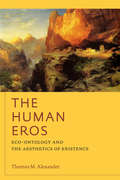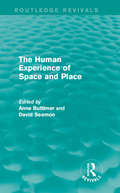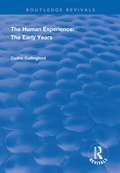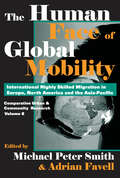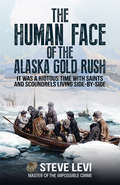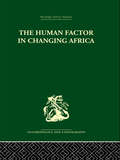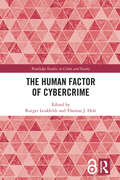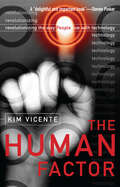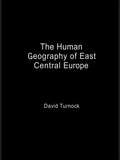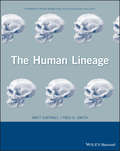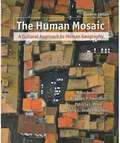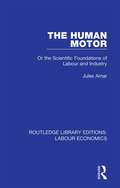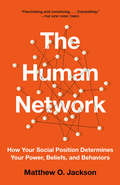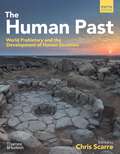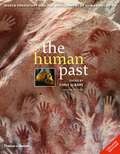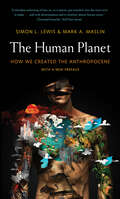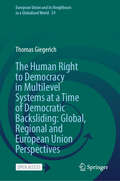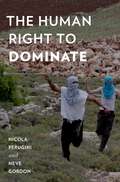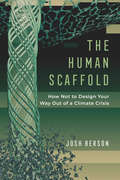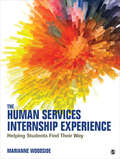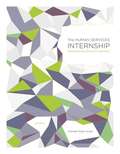- Table View
- List View
The Human Eros: Eco-ontology and the Aesthetics of Existence (American Philosophy)
by Thomas M. AlexanderThe Human Eros explores themes in classical American philosophy, primarily the thought of John Dewey, but also that of Ralph Waldo Emerson, George Santayana, and Native American traditions. Alexander’s primary claim is that human beings have an inherent need to experience meaning and value, a “Human Eros.” Our various cultures are symbolic environments or “spiritual ecologies” within which the Human Eros seeks to thrive. This is how we inhabit the earth. Encircling and sustaining our cultural existence is nature, yet Western philosophy has not provided adequate conceptual models for thinking ecologically. Alexander introduces the idea of “eco-ontology” to explore ways in which this might be done, beginning with the primacy of Nature over Being but also including the recognition of possibility and potentiality as inherent aspects of existence. He argues for the centrality of Dewey’s thought to an effective ecological philosophy. Both “pragmatism” and “naturalism,” he shows, need to be contextualized within an emergentist, relational, nonreductive view of nature and an aesthetic, imaginative, nonreductive view of intelligence.
The Human Experience of Space and Place (Routledge Revivals)
by David Seamon Anne ButtimerHumanistic geography is one of the major emerging themes which has recently dominated geographic writing. Anne Buttimer has been one of the leading figures in the rise of humanistic geography, and the research students she collected round her at Clark University in the 1970s constituted something of a ‘school’ of humanistic geographers. This school developed a significantly new style of geographical inquiry, giving special emphasis to people’s experience of place, space and environment and often using philosophical and subjective methodology. This collection of essays, first published in 1980, brings together this school and offers insight into philosophical and practical issues concerning the human experience of environments. An extensive range of topics are discussed, and the aim throughout is to weave analytical and critical thought into a more comprehensive understanding of lived experience. This book will be of interest to students of human geography.
The Human Experience: A Recitation Manual for Anthropology (2nd edition)
by Andrew Balkansky Robert Corruccini Meghan HarrisonSupplementary text for anthropology classes.
The Human Experience: The Early Years (Routledge Revivals)
by Cedric CullingfordFirst published in 1999, the focus of this ground-breaking study is on representing the mental world of the child with unprecedented clarity. Cedric Cullingford aims to show that this world, in its normal experience by children, is significantly unlike what we typically assume it to be, and significantly unlike anything exposed by the most prominent research programs. Querying common assumptions about children’s thinking, Cullingford begins with an outline of children’s understanding which emphasizes its range and complexity, along with an address of the mythology of children’s intellectual incapacity and preparation for the approach to be taken in detailing children’s construction of a sense of their world. The following four chapters combine to construct a description of how children approach their world, exploring theory of mind, the self, the family, the school and then the wider social and physical worlds. Cullingford achieves a vividness, immediacy and intensity not seen elsewhere, using the constant medium of the child’s gaze and demonstrating that the youngest child is not simply responsive but is active and critical in interrogating the world.
The Human Face of Global Mobility (Comparative Urban And Community Research Ser. #Vol. 8)
by Michael Peter Smith Favell AdrianAlongside flows of trade and capital, the free movement of professionals, technical personnel, and students is seen as a key aspect of globalization. Yet not much detailed empirical research has been completed about the trajectories and experiences of these highly skilled or highly educated international migrants. What little is known about these forms of "global mobility," and the politics that surround them, contrasts with the abundant theories and accounts of other types of international migration--such as low income economic migration from less developed to core countries in the international political economy. Drawing on the work of a long-standing discussion group at the Center for Comparative and Global Research of UCLA's International Institute, this collection bridges conventional methodological divides, bringing together political scientists, sociologists, demographers, and ethnographers. It explores the reality behind assumptions about these new global migration trends. It challenges widely held views about the elite characteristics of these migrants, the costs and consequences of the brain drain said to follow from the migration of skilled workers, the determinants of national policies on high skilled migrants, and the presumed "effortlessness" of professional mobility in an integrating world. The volume also sheds new light on international student migration, the politics of temporary, non-immigrant workers in the United States, new international forms of regulating movement, and the realities of the everyday lives of multinational employees in the world's transnational cities. Key differences between the regional contexts of this migration in Europe, North America, and the Asia-Pacific are also emphasized.
The Human Face of the Alaska Gold Rush: It was a Riotous Time With Saints and Scoundrels Living Side-By-Side
by Steve LeviIt is the land of the Alaska Gold Rush, where nuggets were said to be the size of goose eggs, where men froze to death in search of the elusive yellow metal, and dancehall girls lured overnight millionaire sourdoughs into marriage. Honky-tonk pianos punctuated the howl of the north wind in towns that were half-tent and half-ramshackle collections of driftwood, whalebone, and packing cases. It was a time of whiskey and gold and long, lonely trails behind a dogsled. It was, in a word, ALASKA. In cities, rugged men and women walked on planks set across streets so deep with spring mud horses could be swallowed. On the tundra, life was a living hell with mosquitoes, gnats, white socks, and biting flies descending in clouds on warm-blooded creatures. On the flip side of the season, temperature could drop to 50 or 60 degrees below zero, cold enough to freeze a can of oil so solid it could be cut in half with a saw. With wind blasting at 100 miles an hour, the chill factor could go down to 100 degrees below zero, cold enough to freeze a person to death in a matter of minutes if he could not find proper shelter. In whiteout conditions, visibility could diminish to a foot in a matter of minutes. It was, in a word, ALASKA.
The Human Factor in Changing Africa
by Melville J. HerskovitsFocussing on the problems of change and resistance to change that mark the African sub-continent, this book examines Africa's place in the world from earliest times. It considers the nature of its peoples in their prehistoric development, the ways in which their cultures were oriented, and the ways in which these cultures guided their reactions to European ideas. It also assesses the human responses to industrial, technological and economic changes and the re-discovery by the Africans of African culture. Originally published in 1962.
The Human Factor in Nursing Home Care
by David Oliver Sally TuremanIn an attempt to challenge the prevailing attitudes and images of nursing homes in America, the authors have written a touching book about the people and the relationships that are a part of nursing home care. Their extensive study of and experience with nursing home residents and caregivers reveal that our negative and often painful thoughts about nursing homes are not always well-founded. The authors effectively use monologue and dialogue to take the reader into the world of the nursing home to observe the work of the nursing home staffs, from administrators to housekeepers, as they become surrogate families and friends of the patients. Most moving are the thoughts and words of the residents themselves, especially as they describe their initial horror and anger at being in the nursing home, and their feelings of abandonment and loss of self-esteem. Valuable for both undergraduate and graduate courses in nursing, social work, psychology, death and dying, pastoral care and counseling, this comprehensive volume is useful as a primary or supplementary text.BACKCOVER COPY In an attempt to challenge the prevailing attitudes and images of nursing homes in America, David Oliver and Sally Tureman have written a touching book about the people and the relationships that are a part of nursing home care. Their extensive study of and experience with nursing home residents and caregivers reveal that our negative and often painful thoughts about nursing homes are not always well-founded. The authors effectively use monologue and dialogue to take the reader into the world of the nursing home to observe the work of the nursing home staffs, from administrators to housekeepers, as they become surrogate families and friends of the patients. Most moving are the thoughts and words of the residents themselves, especially as they describe their initial horror and anger at being in the nursing home, and their feelings of abandonment and loss of self-esteem. The Human Factor in Nursing Home Care provides a new and refreshing perspective of those who provide care in nursing homes and those who receive it. And, in the end, it challenges the reader to consider his or her own images of aging and of dying.
The Human Factor of Cybercrime (Routledge Studies in Crime and Society)
by Thomas J. Holt Rutger LeukfeldtCybercrimes are often viewed as technical offenses that require technical solutions, such as antivirus programs or automated intrusion detection tools. However, these crimes are committed by individuals or networks of people which prey upon human victims and are detected and prosecuted by criminal justice personnel. As a result, human decision-making plays a substantial role in the course of an offence, the justice response, and policymakers' attempts to legislate against these crimes. This book focuses on the human factor in cybercrime: its offenders, victims, and parties involved in tackling cybercrime. The distinct nature of cybercrime has consequences for the entire spectrum of crime and raises myriad questions about the nature of offending and victimization. For example, are cybercriminals the same as traditional offenders, or are there new offender types with distinct characteristics and motives? What foreground and situational characteristics influence the decision-making process of offenders? Which personal and situational characteristics provide an increased or decreased risk of cybercrime victimization? This book brings together leading criminologists from around the world to consider these questions and examine all facets of victimization, offending, offender networks, and policy responses.
The Human Factor: Revolutionizing the Way People Live with Technology
by Kim J. VicenteIn this incessantly readable, groundbreaking work, Vincente makes vividly clear how we can bridge the widening gap between people and technology. He investigates every level of human activity - from simple matters such as our hand-eye coordination to complex human systems such as government regulatory agencies, and why businesses would benefit from making consumer goods easier to use. He shows us why we all have a vital stake in reforming the aviation industry, the health industry, and the way we live day-to-day with technology.
The Human Geography of East Central Europe (Routledge Studies in Human Geography)
by David TurnockThe Human Geography of East Central Europe examines the geography of the transition economies that were not formerly part of the Soviet Union: Albania, Bosnia & Hercegovina, Bulgaria, Croatia, The Czech Republic, Hungary, Macedonia, Poland, Romania, Slovakia, Slovenia, Yugoslavia and East Germany. There is a thematic treatment beginning with the landscape and historical background, which moves on to the social and economic geography (industry, agriculture and infrastructure) and to issues concerning regional development and environmental protection.
The Human Lineage
by Kaye B. Brown Fred H. Smith Matt Cartmill"This textbook, aimed at advanced undergraduates and postgraduates in paleoanthropology courses, tackles a rather difficult task--that of presenting the substantial body of paleontological, genetic, geological and archaeological evidence regarding human evolution, and the associated scientific history, in a logical and readable way without sacrificing either clarity or detail... the sheer quality of the writing and explanatory synthesis in this book will undoubtedly make it a valuable resource for students for many years."--PaleoAnthropology, 2010This book focuses on the last ten million years of human history, from the hominoid radiations to the emergence and diversification of modern humanity. It draws upon the fossil record to shed light on the key scientific issues, principles, methods, and history in paleoanthropology. The book proceeds through the fossil record of human evolution by historical stages representing the acquisition of major human features that explain the success and distinctive properties of modern Homo sapiens.Key features:Provides thorough coverage of the fossil record and sites, with data on key variables such as cranial capacity and body size estimatesOffers a balanced, critical assessment of the interpretative models explaining pattern in the fossil recordEach chapter incorporates a "Blind Alley" box focusing on once prevalent ideas now rejected such as the arboreal theory, seed-eating, single-species hypothesis, and Piltdown manPromotes critical thinking by students while allowing instructors flexibility in structuring their teachingDensely illustrated with informative, well-labelled anatomical drawings and photographsIncludes an annotated bibliography for advanced inquiryWritten by established leaders in the field, providing depth of expertise on evolutionary theory and anatomy through to functional morphology, this textbook is essential reading for all advanced undergraduate students and beginning graduate students in biological anthropology.
The Human Mosaic
by Mona Domosh Roderick P. Neumann Patricia L. Price Terry G. Jordan-BychkovCarrying forward the legacy of original author Terry Jordan-Bychkov, coauthors Mona Domosh, Roderick Neumann and Patricia Price have again provided a thoroughly up-to-date new edition of the classic text,The Human Mosaic. The new edition offers a compelling guided tour of contemporary geography that updates the original's unique Five Theme approach while captivating students with the ways today's geographers interpret our ever more globalized, interdependent world.
The Human Motor: Or the Scientific Foundations of Labour and Industry (Routledge Library Editions: Labour Economics #2)
by Jules AmarFirst published in 1920. This study examines the science of industrial work and the advances in its application to the economic life of the community. The author commences this volume with a brief explanation of the general principles of Theoretical Mechanics which have been applied in the study of the Human Motor. Space has also been devoted to the explanation of the laws of thermo-dynamics and of the Conservation of Energy. These provide the reader with the means by which muscular work and fatigue can be measured. This title will be of interest to students of economics and business.
The Human Network: How Your Social Position Determines Your Power, Beliefs, and Behaviors
by Matthew O. JacksonHere is a fresh, intriguing, and, above all, authoritative book about how our sometimes hidden positions in various social structures—our human networks—shape how we think and behave, and inform our very outlook on life.Inequality, social immobility, and political polarization are only a few crucial phenomena driven by the inevitability of social structures. Social structures determine who has power and influence, account for why people fail to assimilate basic facts, and enlarge our understanding of patterns of contagion—from the spread of disease to financial crises. Despite their primary role in shaping our lives, human networks are often overlooked when we try to account for our most important political and economic practices. Matthew O. Jackson brilliantly illuminates the complexity of the social networks in which we are—often unwittingly—positioned and aims to facilitate a deeper appreciation of why we are who we are.Ranging across disciplines—psychology, behavioral economics, sociology, and business—and rich with historical analogies and anecdotes, The Human Network provides a galvanizing account of what can drive success or failure in life.
The Human Past (Fifth Edition): World Prehistory And The Development Of Human Societies
by Chris ScarreA more diverse author team brings a fresh perspective to a comprehensive text With the most diverse author team to date, the Fifth Edition brings new specialists, new research, and new perspectives to the field, connecting our present to the past in a more equitable and representative way. Careful reconsideration of each chapter’s level of detail resulted in a book that is 13% briefer, but which remains a comprehensive authority on world prehistory, with each chapter written by leading experts on that region.
The Human Past: World Prehistory and the Development of Human Societies
by Chris ScarreTextbook on humans, from 6 million years ago to early civilizations.
The Human Planet: How We Created the Anthropocene
by Mark A. Maslin Simon L. LewisAn exploration of the Anthropocene and “a relentless reckoning of how we, as a species, got ourselves into the mess we’re in today” (The Wall Street Journal).Meteorites, mega-volcanoes, and plate tectonics—the old forces of nature—have transformed Earth for millions of years. They are now joined by a new geological force—humans. Our actions have driven Earth into a new geological epoch, the Anthropocene. For the first time in our home planet's 4.5-billion-year history a single species is increasingly dictating Earth’s future.To some the Anthropocene symbolizes a future of superlative control of our environment. To others it is the height of hubris, the illusion of our mastery over nature. Whatever your view, just below the surface of this odd-sounding scientific word—the Anthropocene—is a heady mix of science, philosophy, history, and politics linked to our deepest fears and utopian visions.Tracing our environmental impacts through time, scientists Simon Lewis and Mark Maslin reveal a new view of human history and a new outlook for the future of humanity in the unstable world we have created.
The Human Right to Democracy in Multilevel Systems at a Time of Democratic Backsliding: Global, Regional and European Union Perspectives (European Union and its Neighbours in a Globalized World #24)
by Thomas GiegerichThis open access book takes stock of the current situation of the human right to democracy in multilevel systems of government - at a time of renewed struggles with antidemocratic forces (democratic backsliding). It tries to answer three questions: (1) Is there a human right to democracy in contemporary global and regional international law as well as European Union law and what consequences does that have for the States&’ governmental structure (top-down perspective on national democracy)? (2) Does the human right to democracy also extend to decision-making at the international and supranational level (bottom-up perspective on international/supranational democracy)? (3) What is the relation between national democracy and international democracy and the corresponding human entitlements (interdependence perspective)? The first part of an answer to these questions derives from the elements of democracy proclaimed by the United Nations as a universal value. The second part results from an investigation of the national and international democratic ingredients of the right of self-determination of peoples, whose recognition and codification is the mainstay of the human rights revolution since 1945. The third part is added by a survey and comparison of the various democratic rights included in the global and regional human rights treaties that constitute the subjective cornerstones of democracy. The fourth part is devoted to analysing the EU as exemplary but imperfect multilevel democracy. In all these parts, the enforcement of democratic entitlements are also discussed. In the fifth part, conclusions will be drawn. The book is addressed to international and EU law experts as well as political scientists.
The Human Right to Dominate
by Nicola Perugini and Neve GordonAt the turn of the millennium, a new phenomenon emerged: conservatives, who just decades before had rejected the expanding human rights culture, began to embrace human rights in order to advance their political goals. In this book, Nicola Perugini and Neve Gordon account for how human rights--generally conceived as a counter-hegemonic instrument for righting historical injustices--are being deployed to further subjugate the weak and legitimize domination. Using Israel/Palestine as its main case study, The Human Right to Dominate describes the establishment of settler NGOs that appropriate human rights to dispossess indigenous Palestinians and military think-tanks that rationalize lethal violence by invoking human rights. The book underscores the increasing convergences between human rights NGOs, security agencies, settler organizations, and extreme right nationalists, showing how political actors of different stripes champion the dissemination of human rights and mirror each other's political strategies. Indeed, Perugini and Gordon demonstrate the multifaceted role that this discourse is currently playing in the international arena: on the one hand, human rights have become the lingua franca of global moral speak, while on the other, they have become reconstrued as a tool for enhancing domination.
The Human Rights City: New York, San Francisco, Barcelona (Routledge Advances in Sociology)
by Michele GrigoloWe are used to thinking of human rights as a matter for state governments to deal with. Much less investigated is the question of what cities do with them, even though urban communities and municipalities have been discussing human rights for quite some time. In this volume, Grigolo borrows the concept of ‘the human rights city’ to invite us to think about a new urban utopia: a place where human rights strive to guide urban life. By turning the question of the meaning and use of human rights in cities into the object of critical investigation, this book tracks the genesis, institutionalisation and implementation of human rights in cities, focussing on New York, San Francisco and Barcelona. Touching also upon matters such as women’s rights, LGBT rights and migrant rights, The Human Rights City emphasises how human rights can serve urban justice but also a neoliberal practice of the city. This book is a useful resource for scholars and students interested in fields such as Sociology of Human Rights, Sociology of Law, International Law, Urban Sociology, Political Sociology and Social Policies.
The Human Scaffold: How Not to Design Your Way Out of a Climate Crisis (Great Transformations #2)
by Josh BersonHumanity has precipitated a planetary crisis of resource consumption—a crisis of stuff. So ingrained is our stuff-centric view that we can barely imagine a way out beyond substituting a new portmanteau of material things for the one we have today.In The Human Scaffold, anthropologist Josh Berson offers a new theory of adaptation to environmental change. Drawing on niche construction, evolutionary game theory, and the enactive view of cognition, Berson considers cases in the archaeology of adaptation in which technology in the conventional sense was virtually absent. Far from representing anomalies, these cases exemplify an enduring feature of human behavior that has implications for our own fate.The time has come to ask what the environmental crisis demands of us not as consumers but as biological beings. The Human Scaffold offers a starting point.
The Human Services Internship Experience: Helping Students Find Their Way
by Marianne R. Woodside"This text is the ‘bread and butter’ for interns who seek to work in human service fields." -Fred Hall, Mississippi College The Human Services Internship Experience: Helping Students Find Their Way aims to help students in field-based courses bridge theory and practice during their internships. The goal is to show students how to apply their academic work in a real-world setting and to confirm and expand their identity as human service professionals. To meet this goal, Marianne Woodside assists students in developing that identity, learn to work within an agency setting, learn to use supervision effectively, and to be aware of multicultural and ethical perspectives in human service delivery and supervision as well as develop the appropriate knowledge, skills, and values to effectively perform the multiple roles of the human service professional. Students will learn how to successfully conclude the internship and transition from intern to employee.
The Human Services Internship Experience: Helping Students Find Their Way
by Marianne R. Woodside"This text is the ‘bread and butter’ for interns who seek to work in human service fields." -Fred Hall, Mississippi College The Human Services Internship Experience: Helping Students Find Their Way aims to help students in field-based courses bridge theory and practice during their internships. The goal is to show students how to apply their academic work in a real-world setting and to confirm and expand their identity as human service professionals. To meet this goal, Marianne Woodside assists students in developing that identity, learn to work within an agency setting, learn to use supervision effectively, and to be aware of multicultural and ethical perspectives in human service delivery and supervision as well as develop the appropriate knowledge, skills, and values to effectively perform the multiple roles of the human service professional. Students will learn how to successfully conclude the internship and transition from intern to employee.
The Human Services Internship: Getting the Most from Your Experience (Third Edition)
by Pamela Myers KiserCovering information from the beginning to the end of an internship, this practical, hands-on book engages readers in a process of thinking and reflection--helping them analyze different experiences and situations they encounter day to day in their field work. A unique six-step model guides readers in enhancing self-awareness, integrating the knowledge and values of the profession, recognizing challenging and dissonant situations, decision-making, and follow-through.
